internet
 Before the internet, people who wanted or needed to research a subject, for personal use or for schoolwork, had to go to the library, because they usually didn’t have the tools to research things at home, with the possible exception of a set of encyclopedias. I think many of us have had a physical set of encyclopedias, but those books had their own set of problems…the greatest being that they quickly became outdated. Of course, the internet has its own set of problems too…the greatest being misinformation and outright lies.
Before the internet, people who wanted or needed to research a subject, for personal use or for schoolwork, had to go to the library, because they usually didn’t have the tools to research things at home, with the possible exception of a set of encyclopedias. I think many of us have had a physical set of encyclopedias, but those books had their own set of problems…the greatest being that they quickly became outdated. Of course, the internet has its own set of problems too…the greatest being misinformation and outright lies.
All that aside, in the not-so-distant past, since it was still in my lifetime, research was done in the library, which is why so many schools had one of their own, at least in junior high and high school. The students, armed with a research subject went to the library and began their search. Basically, the library was the “internet” of the past. Your search would often begin with the card catalog. This was a large cabinet with very small drawers filled with cards with holes in the bottom that were attached to a rod in the bottom of the drawer. The cards were arranged alphabetically so they could be easily researched, but if the subject had a lot of information out there, that did not mean that the search would be a quick one.
Once the desired information was located, the researcher would use a slip of paper (usually provided by the  library) to write down the information the card gave as to the location of the book that housed the detailed information that had been summarized on the card. The card always contained a number such as 746.43, which was really a code for the location of the book needed by the researcher. In this case, the 7 stands for the classification…Art. The first 4 stands for the division…drawings/decorative arts. The 6 stands for the section…textile arts. The numbers following the decimal stand for classification within the section…type of textile. Armed with this information, the researcher was able to go to the section of the library that holds that classification of book and locate their book, or just as often they could go to the librarian and receive help to find their book. Of course, the biggest problem with this type of research is that the book might very likely be checked out already, especially if it was a popular subject. If the book wasn’t available, the researcher would have to wait until it came back or go start the whole process again to find another book that contained the desired information. As I’m sure you can imagine, this type of research was quite frustration, and extremely slow…especially if you had any inkling of the speed of locating information these days. Thankfully back then, no one did, so research papers were assigned weeks early, to be turned in at the end of the quarter or semester.
library) to write down the information the card gave as to the location of the book that housed the detailed information that had been summarized on the card. The card always contained a number such as 746.43, which was really a code for the location of the book needed by the researcher. In this case, the 7 stands for the classification…Art. The first 4 stands for the division…drawings/decorative arts. The 6 stands for the section…textile arts. The numbers following the decimal stand for classification within the section…type of textile. Armed with this information, the researcher was able to go to the section of the library that holds that classification of book and locate their book, or just as often they could go to the librarian and receive help to find their book. Of course, the biggest problem with this type of research is that the book might very likely be checked out already, especially if it was a popular subject. If the book wasn’t available, the researcher would have to wait until it came back or go start the whole process again to find another book that contained the desired information. As I’m sure you can imagine, this type of research was quite frustration, and extremely slow…especially if you had any inkling of the speed of locating information these days. Thankfully back then, no one did, so research papers were assigned weeks early, to be turned in at the end of the quarter or semester.
Once you had your hands on the desired book or a comparable alternative, you were required to read all or  most of the book to find the information you needed for your research project. You couldn’t simply ask the book a question and expect an answer like you can today with the computer and the internet. While today’s type of research is much easier, I’m sure there are many people who would say that the challenge of the “dig for information” is completely and sadly lost. I suppose they are right, but since I’m a techy, I would find that kind of research frustrating, since I do know about the computer and the internet. Thankfully, when I had to research information in my youth, I had no idea that the internet would exist in just a few short years, so the frustration was averted.
most of the book to find the information you needed for your research project. You couldn’t simply ask the book a question and expect an answer like you can today with the computer and the internet. While today’s type of research is much easier, I’m sure there are many people who would say that the challenge of the “dig for information” is completely and sadly lost. I suppose they are right, but since I’m a techy, I would find that kind of research frustrating, since I do know about the computer and the internet. Thankfully, when I had to research information in my youth, I had no idea that the internet would exist in just a few short years, so the frustration was averted.

 My grandnephew, Easton Moore is getting ready to start the next phase of his life and is still considering his options. The rest of us are sitting here wondering where all the years went. It seems impossible that Easton could be out of elementary school, much less high school. Currently, Easton is a supervisor at McDonald’s, which is a pretty good accomplishment for a young man of just 18 years. He is looking forward to the end of school now, because as supervisor, he is required to close, which makes for late nights and little sleep…which accounts for his mom, Machelle Moore’s ability to catch him sleeping during the day and having the evidence to prove it.
My grandnephew, Easton Moore is getting ready to start the next phase of his life and is still considering his options. The rest of us are sitting here wondering where all the years went. It seems impossible that Easton could be out of elementary school, much less high school. Currently, Easton is a supervisor at McDonald’s, which is a pretty good accomplishment for a young man of just 18 years. He is looking forward to the end of school now, because as supervisor, he is required to close, which makes for late nights and little sleep…which accounts for his mom, Machelle Moore’s ability to catch him sleeping during the day and having the evidence to prove it.
Easton has spent a lot of time tinkering on his own vehicle and has found that he really has a knack for it. 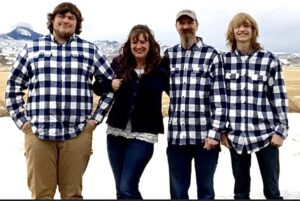 Easton has also helped his friends work on their vehicles, so he is actually building a clientele of sorts already. In fact, mechanics is one of the things Easton is considering as a career option, a side option, or a temporary option while he prepares for the other possible career option that he is considering. Like most young people, Easton is very comfortable with computers, and would not mind getting a job on the internet or maybe in computer programing. The possibilities in computers are endless right now, and things are advancing so fat that what seems far-fetched today is very possible in the very near future.
Easton has also helped his friends work on their vehicles, so he is actually building a clientele of sorts already. In fact, mechanics is one of the things Easton is considering as a career option, a side option, or a temporary option while he prepares for the other possible career option that he is considering. Like most young people, Easton is very comfortable with computers, and would not mind getting a job on the internet or maybe in computer programing. The possibilities in computers are endless right now, and things are advancing so fat that what seems far-fetched today is very possible in the very near future.
One thing Easton isn’t considering right now is moving out on his own. Like most high school graduates, he would like to, but with rentals in Powell running around $1000 a month for a one-bedroom apartment, that is just not feasible. Moving out right now around here is not a good idea. So, his plan is to live at home, while 
 working, and to begin taking college classes to advance his computer skills, so that if that is what he decided he wants to do in life, he is moving in the right direction for it. As for his mom and dad, I’m sure this plan doesn’t hurt their feelings one bit, because they were facing the “empty nest” and I don’t think they were really very happy about it. Sometimes, it’s nice for the parents to have a little reprieve…even if it’s just a little one. Easton is graduation today and getting ready to go out into the world and make his own mark. Congratulations Easton!! We are very proud of you!!
working, and to begin taking college classes to advance his computer skills, so that if that is what he decided he wants to do in life, he is moving in the right direction for it. As for his mom and dad, I’m sure this plan doesn’t hurt their feelings one bit, because they were facing the “empty nest” and I don’t think they were really very happy about it. Sometimes, it’s nice for the parents to have a little reprieve…even if it’s just a little one. Easton is graduation today and getting ready to go out into the world and make his own mark. Congratulations Easton!! We are very proud of you!!
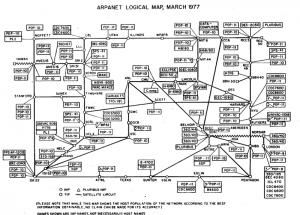 In this technological age, everyone has heard of the internet…even those who don’t know how to use it. It is thought to be the most advanced way to access information, and that is true. People don’t have to even leave their homes to have access to information, products, email, or media…even social media. It was an amazing invention, and some might say it was a time hog. It was the invention of all time, but…it wasn’t the first of it’s kind.
In this technological age, everyone has heard of the internet…even those who don’t know how to use it. It is thought to be the most advanced way to access information, and that is true. People don’t have to even leave their homes to have access to information, products, email, or media…even social media. It was an amazing invention, and some might say it was a time hog. It was the invention of all time, but…it wasn’t the first of it’s kind.
On October 29, 1969, the Advanced Research Projects Agency Network (ARPANET) an early packet-switching network and the first network to implement the TCP/IP protocol suite was presented. Both of those technologies became the technical foundation of the Internet. The ARPANET was initially founded by the Advanced Research Projects Agency (ARPA) of the United States Department of Defense. It seems fitting to me that the Department of Defense would be the first ones to access such instantaneous information sources. Many people and even government agencies might have thought that the average person had no need to be able to access such information, but that would be wrong. Now it’s vital.
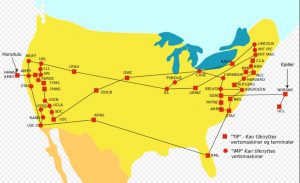
Paul Baran, Donald Davies, Leonard Kleinrock, and Lawrence Roberts came up with the concepts, and designed the packet-switching methodology employed in the ARPANET. The TCP/IP communications protocols were developed for the ARPANET by Robert Kahn and Vint Cerf. They also incorporated concepts from the French CYCLADES project directed by Louis Pouzin. As the network development progressed, protocols for internetworking were developed by which multiple separate networks could be joined into a network of networks. Access to the ARPANET was expanded in 1981, when the National Science Foundation (NSF) funded the Computer Science Network (CSNET). In 1982, the Internet protocol suite (TCP/IP) was introduced as the standard networking software stack in the ARPANET. In the early 1980s, the NSF funded the establishment of national supercomputing centers at several universities, and provided network access and network interconnectivity with the NSFNET project in 1986. The ARPANET project was formally decommissioned in 1990, 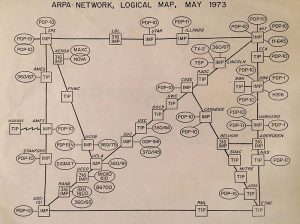 after partnerships with the telecommunication industry paved the way of future commercialization of a new world-wide network…the Internet.
after partnerships with the telecommunication industry paved the way of future commercialization of a new world-wide network…the Internet.
I’m sure that, like the pre-windows DOS program, the ARPANET was quite a bit more primitive. Still, it was an amazing thing to be able to connect with people who were a good distance away from you, and pass data along to them. Of course, the only ones who had access were those in the network, but then when you think about it, if you don’t have internet access, you are out of the loop too, so I guess it is no different really. Most of us thought that the internet was a unique invention, but in reality, it was second in line.

 With yesterday’s eclipse, came a massive amount of videos and photos documenting the event. Before it was even over, people all over the world were able to view the event. NASA filmed it and posted it on their website…including the moments when the International Space Station flew in front of it!! It was an awesome way for people, who were unable to get to the path of totality, to view the event. While we give little thought to such abilities today, just a few years back, they would have seemed impossible, or at the very least, they would have shocked us. That’s because we have things like television, internet, cell phones, and digital cameras…but they didn’t then. The television was looked upon as a fad that would never take hold. People simply wouldn’t spend the money on one. How very wrong they were.
With yesterday’s eclipse, came a massive amount of videos and photos documenting the event. Before it was even over, people all over the world were able to view the event. NASA filmed it and posted it on their website…including the moments when the International Space Station flew in front of it!! It was an awesome way for people, who were unable to get to the path of totality, to view the event. While we give little thought to such abilities today, just a few years back, they would have seemed impossible, or at the very least, they would have shocked us. That’s because we have things like television, internet, cell phones, and digital cameras…but they didn’t then. The television was looked upon as a fad that would never take hold. People simply wouldn’t spend the money on one. How very wrong they were.
Lets travel back in time to when television first came out. All the people had were radios to hear about the things that were going on…or the newspapers. There was simply no way to show the people what an eclipse looked like, unless they saw it for themselves. No way to warn them of the serious dangers of looking at it. Things like that were by trial and error. Not only that, but they really couldn’t predict and eclipse. And space travel…what was that? Nevertheless, the dawning of a new age was upon them. The days of being in the dark when it came to world events was about to end. And television would bring with it so much more than just the news. Still, the television, when it first made its appearance on the planet, cost a lot of money. Far to much money for the average family to spend on the new fangled contraption, so few people had one. That didn’t stop the kids, and even adults, from watching it in the store windows, they just didn’t get to watch it very often.
As time went by, the prices of televisions came down, and people realized that this wasn’t just a passing fad. 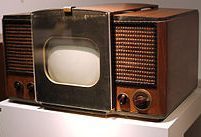
 These days, nearly every household in the United States, if not the world has one, and those who don’t, have likely chosen to walk away from the television. And we aren’t even tied to our homes to watch television now. We can watch it from our computers or even our cell phones. Wow!! How far we have come. News is only new for a few seconds, and by the time stories come out in the paper, they have already been read on the internet. Before long, I’m sure the newspaper will become obsolete…if it hasn’t already.
These days, nearly every household in the United States, if not the world has one, and those who don’t, have likely chosen to walk away from the television. And we aren’t even tied to our homes to watch television now. We can watch it from our computers or even our cell phones. Wow!! How far we have come. News is only new for a few seconds, and by the time stories come out in the paper, they have already been read on the internet. Before long, I’m sure the newspaper will become obsolete…if it hasn’t already.
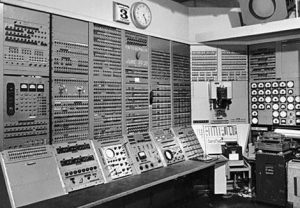 These days, being connected to the internet is commonplace. We connect from our computer, laptop, tablet, and even our phone. Many occupations, including the one I am in could not really function without the internet. When the computers go down, we are shut down too. For most of us, the internet is so much a part of our lives, that we simply cannot imagine life without it. Nevertheless, the reality is that until quite recently, there was no internet. I know people who think that might have been a better time, but I disagree. In fact, I think the people who say they think that, really have no idea just how bad that would be, and if they tried it once, they would change their minds quickly. People don’t realize how many things depend on the internet.
These days, being connected to the internet is commonplace. We connect from our computer, laptop, tablet, and even our phone. Many occupations, including the one I am in could not really function without the internet. When the computers go down, we are shut down too. For most of us, the internet is so much a part of our lives, that we simply cannot imagine life without it. Nevertheless, the reality is that until quite recently, there was no internet. I know people who think that might have been a better time, but I disagree. In fact, I think the people who say they think that, really have no idea just how bad that would be, and if they tried it once, they would change their minds quickly. People don’t realize how many things depend on the internet.
The first real idea of information available at our fingertips began to form on October 4, 1957, when the Soviet Union launched the world’s first manmade satellite into orbit. Known as Sputnik, the satellite did not do much. It tumbled aimlessly around in outer space, sending blips and bleeps from its radio transmitters as it circled the Earth. Nevertheless, to many Americans, the one foot diameter Sputnik was proof of something alarming. Up to this point, scientists and engineers in the United States had been designing bigger cars and better television sets, but the Soviets had been focusing on…less frivolous things, and they were going to win the Cold War because of it. Americans saw that information could eventually be transmitted back to the Soviets concerning American military and government secrets. It was the dawning of the age of spy satellites.
Sputnik’s launch, brought about the era of science and technology in America. In an effort to keep up, schools began teaching subjects like chemistry, physics and calculus. The government gave grants to corporations, who invested them in scientific research and development. The federal government formed new agencies, such as the National Aeronautics and Space Administration (NASA) and the Department of Defense’s Advanced Research Projects Agency (ARPA), to develop space-age technologies such as rockets, weapons and computers. Of course, the computer didn’t do nearly as much as it does these days, and it was the size of a small house. In 1962, a scientist from M.I.T. and ARPA named J.C.R. Licklider proposed a solution to this problem. His proposal  was a “galactic network” of computers that could talk to one another. Such a network would enable government leaders to communicate even if the Soviets destroyed the telephone system. Then came “packet switching.” Packet switching breaks data down into blocks, or packets, before sending it to its destination. That way, each packet can take its own route from place to place. Without packet switching, the government’s computer network, which is now known as the ARPAnet, would have been just as vulnerable to enemy attacks as the phone system. At least now computers did more, but they were still big.
was a “galactic network” of computers that could talk to one another. Such a network would enable government leaders to communicate even if the Soviets destroyed the telephone system. Then came “packet switching.” Packet switching breaks data down into blocks, or packets, before sending it to its destination. That way, each packet can take its own route from place to place. Without packet switching, the government’s computer network, which is now known as the ARPAnet, would have been just as vulnerable to enemy attacks as the phone system. At least now computers did more, but they were still big.
In 1969, ARPAnet delivered its first message. A “node-to-node” communication from one computer located in a research lab at UCLA, to the second located at Stanford. The message “LOGIN” was short and simple, and it crashed the ARPA network. Wow!! Things really are different today. The Stanford computer only received the note’s first two letters. By the end of 1969, just four computers were connected to the Arpanet. During the 1970s the network grew steadily. In 1971, it added the University of Hawaii’s ALOHAnet, and two years later it added networks at London’s University College and the Royal Radar Establishment in Norway. As packet-switched computer networks multiplied, it became more difficult for them to integrate into a single worldwide “Internet.” By the end of the 1970s, a computer scientist named Vinton Cerf had begun to solve this problem by developing a way for all of the computers on all of the world’s mini-networks to communicate with one another. He called his invention “Transmission Control Protocol,” or TCP. Later, he added an additional protocol, known as “Internet Protocol.” The acronym we use to refer to these today is TCP/IP. One writer describes Cerf’s protocol as “the ‘handshake’ that introduces distant and different computers to each other in a virtual space.”
Cerf’s protocol transformed the Internet into a worldwide network. Throughout the 1980s, researchers and scientists used it to send files and data from one computer to another. In 1991 the Internet changed again. That year, a computer programmer in Switzerland named Tim Berners-Lee introduced the World Wide Web…an Internet that was not simply a way to send files from one place to another, but was itself a “web” of information that anyone on the Internet could retrieve. Berners-Lee created the Internet that we know and use today. Since then, the Internet has changed in many ways, and will likely continue to change as time goes on.  In 1992, a group of students and researchers at the University of Illinois developed a browser that they called Mosaic, later known as Netscape. Mosaic offered a user-friendly way to search the Web. It allowed users to see words and pictures on the same page for the first time and to navigate using scrollbars and clickable links. Then Congress decided that the Web could be used for commercial purposes. Companies developed websites of their own, and e-commerce entrepreneurs began to use the Internet to sell goods directly to customers. These days, social networking sites like Facebook have become a popular way for people of all ages, including me, to stay connected. Today, almost one-third of the world’s 6.8 billion people use the Internet regularly.
In 1992, a group of students and researchers at the University of Illinois developed a browser that they called Mosaic, later known as Netscape. Mosaic offered a user-friendly way to search the Web. It allowed users to see words and pictures on the same page for the first time and to navigate using scrollbars and clickable links. Then Congress decided that the Web could be used for commercial purposes. Companies developed websites of their own, and e-commerce entrepreneurs began to use the Internet to sell goods directly to customers. These days, social networking sites like Facebook have become a popular way for people of all ages, including me, to stay connected. Today, almost one-third of the world’s 6.8 billion people use the Internet regularly.

 In some ways, I think my sister-in-law, Rachel Franklin Schulenberg, is a lot like me. She has a nostalgic side when it comes to things of the past, as do I. I think we both wish time wouldn’t go by so fast, or that our children and grandchildren wouldn’t grow up so fast. I suppose that is harder when you have family who live somewhere else, as both Rachel and I do. You just miss them so much when you can’t see them often.
In some ways, I think my sister-in-law, Rachel Franklin Schulenberg, is a lot like me. She has a nostalgic side when it comes to things of the past, as do I. I think we both wish time wouldn’t go by so fast, or that our children and grandchildren wouldn’t grow up so fast. I suppose that is harder when you have family who live somewhere else, as both Rachel and I do. You just miss them so much when you can’t see them often.
Rachel is a strong Christian, who has the heart of a giver. She tries to be helpful to all who need her help. That is such a great trait to have. So many people these days think only of themselves, but not so Rachel. I’m sure that is partly why she has a number of very good friends. People tend to want to be around people who aren’t selfish. I agree with that. Those are the kinds of people I want to be around too.
Rachel is mother to Cassie, Riley, and Tucker, and grandma to Lucas and Zoey. Her children and grandchildren are precious to her. All of them, except Tucker live in Powell, Wyoming, so she doesn’t get to see them nearly as often as she would like to. I think that has to be the hardest think for a mother or grandmother. You miss them terribly when you don’t see them, and you are torn at the end of every visit, because it will be a while 
 before you see them again. Yes, phones and Internet make it easier to be apart, but they don’t compare to being with your child or grandchild. Nevertheless, not everyone wants to live in the same place, and as they grow up, children have to decide for themselves…at least that’s what Rachel and I keep telling ourselves. Maybe someday our minds will take hold of that thought, but I seriously doubt it. In the meantime, I guess we will just have to continue to cultivate our nostalgic side. Today is Rachel’s birthday. Happy birthday Rachel!! Have a great day!! We love you!!
before you see them again. Yes, phones and Internet make it easier to be apart, but they don’t compare to being with your child or grandchild. Nevertheless, not everyone wants to live in the same place, and as they grow up, children have to decide for themselves…at least that’s what Rachel and I keep telling ourselves. Maybe someday our minds will take hold of that thought, but I seriously doubt it. In the meantime, I guess we will just have to continue to cultivate our nostalgic side. Today is Rachel’s birthday. Happy birthday Rachel!! Have a great day!! We love you!!
 In this day of the internet, cell phones, television, and radio, a new form of patriotism has emerged. The rights our American soldiers fought for are in peril. In a year in which many Americans were offended by literally everything, and the internet, specifically Facebook, has become one of the greatest sounding boards there is, everyone has stepped up to the plate to state their views and yes, even to hear the views of others. Of course, hearing the views of other people, is not always something that is well received. Sometimes, people lose sight of the fact that since we each own our own Facebook page, we also have the right to say what we want to say. Others may not agree, but that doesn’t matter, because this is our page…our right to free speech.
In this day of the internet, cell phones, television, and radio, a new form of patriotism has emerged. The rights our American soldiers fought for are in peril. In a year in which many Americans were offended by literally everything, and the internet, specifically Facebook, has become one of the greatest sounding boards there is, everyone has stepped up to the plate to state their views and yes, even to hear the views of others. Of course, hearing the views of other people, is not always something that is well received. Sometimes, people lose sight of the fact that since we each own our own Facebook page, we also have the right to say what we want to say. Others may not agree, but that doesn’t matter, because this is our page…our right to free speech.

Of course, people with differing views have the right to challenge our views…to state their own case, as it were, but they don’t have the right to challenge our right to speak our own opinion on our own page. If we are offended by the views of another person, we need to move past the post. Never is this more evident than when the opinions of one person in a family offends another, and they decided to take things to the next level…unfriending. I won’t do that, because while I will state my opinion, and I will respect the rights of my friends to post what they choose, and to debate my opinion, the family connection is far too important to me to argue in  such a way.
such a way.
In history, patriots had to go to the place they were going to protest. And of course, by the time they could get there, it was probably too late to protest. I suppose maybe our politicians were more honest back then, or maybe we just didn’t know all that was going on. It has been said that some presidents would never have been elected if we could have seen them. That is so true, and sometimes I think maybe that should be how it is today. If race, gender, and maybe even party affiliation weren’t able to be seen, who would we elect? That might be something to think about. Maybe we need to stop giving a pass because of race or gender, and make the politicians do what’s right.
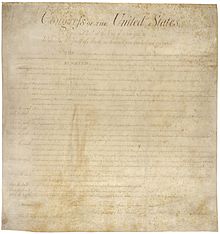 A few days ago, I wrote about the United States Constitution, and how it was ratified by Massachusetts, with the condition that it be amended to include some rights that they felt were very important. On this day, September 25, 1789, those amendments were created. The first ten became the Bill Of Rights. These amendments would not be ratified until December 15, 1791. These days, there is some confusion and some complete ignorance as to the meaning of some of these rights…especially the first amendment. I can’t count the number of times that I have heard that according to the constitution, we are to have separation of church and state. That could not be further from the truth, and in fact would be an impossibility. The very idea that a person who holds political office could separate his or her religious values from their voting on matters concerning laws of the land is insane, and it is not what our forefathers meant when the Bill of Rights was created. The first amendment reads, “Congress shall make no law respecting an establishment of religion, or prohibiting the free exercise thereof; or abridging the freedom of speech, or of the press; or the right of the people peaceably to assemble, and to petition the Government for a redress of grievances.” All the first amendment…the part concerning religion, anyway…means is that Congress in not allowed to make a law saying that the United States is going to be one certain religion. England had such a law, and that was one of the main reasons the pilgrims left there.
A few days ago, I wrote about the United States Constitution, and how it was ratified by Massachusetts, with the condition that it be amended to include some rights that they felt were very important. On this day, September 25, 1789, those amendments were created. The first ten became the Bill Of Rights. These amendments would not be ratified until December 15, 1791. These days, there is some confusion and some complete ignorance as to the meaning of some of these rights…especially the first amendment. I can’t count the number of times that I have heard that according to the constitution, we are to have separation of church and state. That could not be further from the truth, and in fact would be an impossibility. The very idea that a person who holds political office could separate his or her religious values from their voting on matters concerning laws of the land is insane, and it is not what our forefathers meant when the Bill of Rights was created. The first amendment reads, “Congress shall make no law respecting an establishment of religion, or prohibiting the free exercise thereof; or abridging the freedom of speech, or of the press; or the right of the people peaceably to assemble, and to petition the Government for a redress of grievances.” All the first amendment…the part concerning religion, anyway…means is that Congress in not allowed to make a law saying that the United States is going to be one certain religion. England had such a law, and that was one of the main reasons the pilgrims left there.
Religion has been in the news a lot lately, and there have been many arguments about it. Which brings me to the next part of the first amendment “or prohibiting the free exercise thereof.” People don’t have to agree with my views on religion, but they are prohibited from telling me that I cannot express my religious views in speech, or on the internet. There are a lot of people telling other people that they have no right to talk or post about their religion, but they are completely wrong. We have every right to do so. Contrary to what some people might think, these rights are not negotiable…they are absolute. I can’t tell others not to talk about their religion, and they can’t tell me not to. It is the law.
As to “or abridging the freedom of speech, or of the press; or the right of the people peaceably to assemble, and to petition the Government for a redress of grievances”, we may not always agree with what people say, and sometimes it isn’t nice, but they have a right to speak. They have a right to give their opinion, whether others like it or not. By the same token, we have the right not to like what is said, and thereby we can decide not to like the person. That is our choice. The same applies to the press. That is the main reason why so many people just don’t believe a word some rag newspapers print. They can say what they want…true or not.
There are so many other violations of the Bill of Rights, that it would take a book to list them all, but I would really encourage everyone to get a copy of the Bill Of Rights, and find out for yourself exactly what is written there. Every time we allow our rights to be trampled on, we lose a little bit of the rights that we were intended to have through the Constitution and the Bill Of Rights. The longer those violations are allowed to go 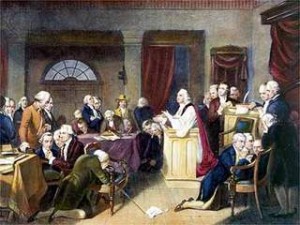 on, the more people think that they understand their rights, when they really don’t, and so they end up giving their rights away. Our Constitution and the Bill Of Rights, and indeed, all the amendments to the Constitution, are so important to each and every one of us, and we need to know what is there, so that when some branch of the government steps on those rights, and someone speaks out about it, we don’t find ourselves on the wrong side of the issue. It really isn’t about whether or not we agree with the issue, but whether or not it is legal, because if the government will take away one right illegally, they will also take away another right illegally, and someday, they will get to one that affects you…but by then, it may be too late to stop an already runaway government.
on, the more people think that they understand their rights, when they really don’t, and so they end up giving their rights away. Our Constitution and the Bill Of Rights, and indeed, all the amendments to the Constitution, are so important to each and every one of us, and we need to know what is there, so that when some branch of the government steps on those rights, and someone speaks out about it, we don’t find ourselves on the wrong side of the issue. It really isn’t about whether or not we agree with the issue, but whether or not it is legal, because if the government will take away one right illegally, they will also take away another right illegally, and someday, they will get to one that affects you…but by then, it may be too late to stop an already runaway government.
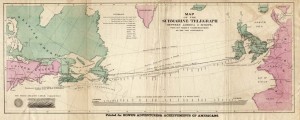 Communications have come a long way over the years. Still, most of us give little thought to how difficult it used to be in the not so distant past. Of course, letters were originally the only form of distant communications, and I suppose that some people, like my Uncle Bill, still think that is the best form of communication there ever was. These days, I would have to agree with them in many ways, but there are times when a letter is not quick enough. When the telegraph was invented in the 1830s and 1840s, it revolutionized communication. No longer did it take months to get an important message to family members. Prior to that time, a loved on might be dead for months before the family found out. I’m sure that in most cases, people still relied on letters for most things, so receiving an unexpected telegraph was probably a little scary.
Communications have come a long way over the years. Still, most of us give little thought to how difficult it used to be in the not so distant past. Of course, letters were originally the only form of distant communications, and I suppose that some people, like my Uncle Bill, still think that is the best form of communication there ever was. These days, I would have to agree with them in many ways, but there are times when a letter is not quick enough. When the telegraph was invented in the 1830s and 1840s, it revolutionized communication. No longer did it take months to get an important message to family members. Prior to that time, a loved on might be dead for months before the family found out. I’m sure that in most cases, people still relied on letters for most things, so receiving an unexpected telegraph was probably a little scary.
While telegraph made communications easier in our own country, trying to get an important message to someone from the homeland…not so much. Not until 1866, that is. Early attempts were made to lay 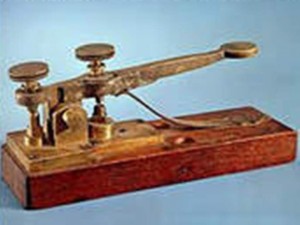 Transatlantic cable for the telegraph in the late 1850s, but those failed, and the confidence of the people was lost, taking with it investors willing to fork out the funds to undertake the next attempt. The first project began in 1854 and was completed in 1858. The cable functioned for only three weeks, but it was the first such project to yield practical results, so progress was being made. The first official telegram to pass between two continents was a letter of congratulation from Queen Victoria of the United Kingdom to the President of the United States James Buchanan on August 16, 1858. Signal quality quickly declined, slowing transmission to an almost unusable speed. The cable was destroyed the following month when Wildman Whitehouse applied excessive voltage to it while trying to achieve faster operation. The cable’s rapid failure undermined public and investor confidence and delayed efforts to restore a connection. A second attempt was undertaken in 1865 with much better materials, and following some setbacks, a connection was completed and put into service on July 28, 1866. This cable proved more durable.
Transatlantic cable for the telegraph in the late 1850s, but those failed, and the confidence of the people was lost, taking with it investors willing to fork out the funds to undertake the next attempt. The first project began in 1854 and was completed in 1858. The cable functioned for only three weeks, but it was the first such project to yield practical results, so progress was being made. The first official telegram to pass between two continents was a letter of congratulation from Queen Victoria of the United Kingdom to the President of the United States James Buchanan on August 16, 1858. Signal quality quickly declined, slowing transmission to an almost unusable speed. The cable was destroyed the following month when Wildman Whitehouse applied excessive voltage to it while trying to achieve faster operation. The cable’s rapid failure undermined public and investor confidence and delayed efforts to restore a connection. A second attempt was undertaken in 1865 with much better materials, and following some setbacks, a connection was completed and put into service on July 28, 1866. This cable proved more durable.
At that point, telegraph communications with the homeland of our nation’s immigrants became possible. While I’m sure it wasn’t inexpensive to send a telegraph…by the standards of the day, it did give the ability to keep in touch with family back home, and really, that was what it was all about. A letter from New York to England  took ten days…provided nothing happened to the ship it set sail on. And it still had to get from out west, if that was where you lived to the east coast. I don’t think a month was far off on this. But then how good was the mail service in Europe? It could still easily take another several weeks for the letter to arrive. Primitive communications for sure. Of course, very few people use telegraph these days. I believe it can still be used to wire money, but electronic transfers are much faster, and often free, so why use it? That is the funny thing about inventions. They are only good until the next big thing that is invented makes the old ones obsolete. That is what things like the cell phone, the internet, and electronic transfers have done to things like letter writing and telegraph.
took ten days…provided nothing happened to the ship it set sail on. And it still had to get from out west, if that was where you lived to the east coast. I don’t think a month was far off on this. But then how good was the mail service in Europe? It could still easily take another several weeks for the letter to arrive. Primitive communications for sure. Of course, very few people use telegraph these days. I believe it can still be used to wire money, but electronic transfers are much faster, and often free, so why use it? That is the funny thing about inventions. They are only good until the next big thing that is invented makes the old ones obsolete. That is what things like the cell phone, the internet, and electronic transfers have done to things like letter writing and telegraph.
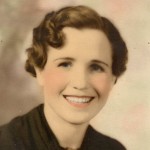
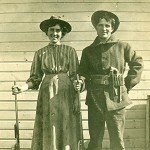 Life in the late 1800s was much different from life today, and in many ways, I must say better. It was a more gentle, moral time. I was once again reading through my Great Aunt Bertha Schumacher Hallgren’s journal, and wondering how it can be that every time I look through it, I see a part of the history of my family that I hadn’t noticed before. For a while now, I have wondered why so little is mentioned in the journal about my grandmother, Anna Schumacher Spencer. Of course, the main reason is that by the time Bertha started writing, my grandmother was married and living in Minnesota or Wisconsin. She is mentioned in the younger years, but it was harder to know much about her daily life then, because things like cell phones, free long distance, and internet did not exist. I find it sad in so many ways that they could not stay in closer contact. I wonder if those of us in this day and age really know just how blessed we are, and how very important it is to stay in touch.
Life in the late 1800s was much different from life today, and in many ways, I must say better. It was a more gentle, moral time. I was once again reading through my Great Aunt Bertha Schumacher Hallgren’s journal, and wondering how it can be that every time I look through it, I see a part of the history of my family that I hadn’t noticed before. For a while now, I have wondered why so little is mentioned in the journal about my grandmother, Anna Schumacher Spencer. Of course, the main reason is that by the time Bertha started writing, my grandmother was married and living in Minnesota or Wisconsin. She is mentioned in the younger years, but it was harder to know much about her daily life then, because things like cell phones, free long distance, and internet did not exist. I find it sad in so many ways that they could not stay in closer contact. I wonder if those of us in this day and age really know just how blessed we are, and how very important it is to stay in touch.
Because so many people had begun to move west, and things like towns, churches, and even schools were more scarce then, often, the religious training of the children happened at home. Bertha mentions in her journal that my great grandparents were dissatisfied by the fact that they were only able to attend church a few times a year. Carl and Henriette knew that this was not the kind of upbringing they wanted for their children. Even though they were both devout Lutherans, they knew that their children really needed to be in church…and they did too. It is so easy to slide in one’s faith when the family isn’t getting weekly or even more often, teaching in a church setting. So, Great Grandpa sold the quarter section of land that they owned, and purchased 320 acres just three miles east of Lisbon, North Dakota. Bertha remarks that this was a nice home with one of the few bathrooms in the country, and an artesian well. It must have been like moving into a castle. We take such things for granted these days. They did not.
The artesian well helped to form a ten acre lake, which my grandfather, Allen Spencer later stocked with catfish. Great Grandpa Carl Schumacher built a safe flat bottom boat for the younger children, so they could all enjoy the lake. This was a time of joy and happiness for the family. Life was changing, the children were growing up and moving out on their own, and new babies were coming too. Times were getting easier 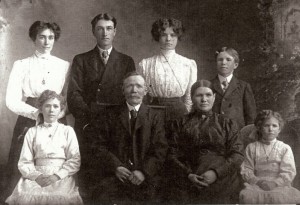 with new inventions every day designed to make life easier. Nevertheless, the problem of distance remained. I’m sure that Bertha would have written more about her older siblings families, had she had the opportunity to know them better. As a writer myself, I can relate to that. There are family members about whom it is more difficult to write, because I am not around them often. There are others about whom I know much, and so writing is easy. Nevertheless, if I write about them or not, they are all dear to me and in my thoughts often. I am, however, grateful to Bertha for her writings and the insight it has brought to me. Bertha has been an inspiration and a blessing to me. Through her writings, I feel like I know people I never met, and that is a limitless gift. It just keeps on giving.
with new inventions every day designed to make life easier. Nevertheless, the problem of distance remained. I’m sure that Bertha would have written more about her older siblings families, had she had the opportunity to know them better. As a writer myself, I can relate to that. There are family members about whom it is more difficult to write, because I am not around them often. There are others about whom I know much, and so writing is easy. Nevertheless, if I write about them or not, they are all dear to me and in my thoughts often. I am, however, grateful to Bertha for her writings and the insight it has brought to me. Bertha has been an inspiration and a blessing to me. Through her writings, I feel like I know people I never met, and that is a limitless gift. It just keeps on giving.

